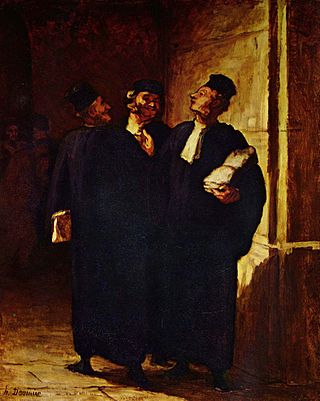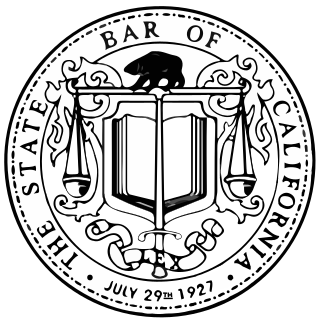Related Research Articles

An advocate is a professional in the field of law. Different countries' legal systems use the term with somewhat differing meanings. The broad equivalent in many English law–based jurisdictions could be a barrister or a solicitor. However, in Scottish, Manx, South African, Italian, French, Spanish, Portuguese, Scandinavian, Polish, Israeli, South Asian and South American jurisdictions, "Advocate" indicates a lawyer of superior classification.
A bar association is a professional association of lawyers as generally organized in countries following the Anglo-American types of jurisprudence. The word bar is derived from the old English/European custom of using a physical railing to separate the area in which court business is done from the viewing area for the general public.

Admission to the bar in the United States is the granting of permission by a particular court system to a lawyer to practice law in the jurisdiction and before those courts. Each U.S. state and similar jurisdiction has its own court system and sets its own rules for bar admission, which can lead to different admission standards among states. In most cases, a person is "admitted" or "called" to the bar of the highest court in the jurisdiction and is thereby authorized to practice law in the jurisdiction. Federal courts, although often overlapping in admission standards with states, set their own requirements for practice in each of those courts.

The American Bar Association (ABA) is a voluntary bar association of lawyers and law students; it is not specific to any jurisdiction in the United States. Founded in 1878, the ABA's stated activities are the setting of academic standards for law schools, and the formulation of model ethical codes related to the legal profession. As of fiscal year 2017, the ABA had 194,000 dues-paying members, constituting approximately 14.4% of American attorneys. In 1979, half of all lawyers in the U.S. were members of the ABA. The organization's national headquarters are in Chicago, Illinois, and it also maintains a significant branch office in Washington, D.C.
A bar examination is an examination administered by the bar association of a jurisdiction that a lawyer must pass in order to be admitted to the bar of that jurisdiction.
A union security agreement is a contractual agreement, usually part of a union collective bargaining agreement, in which an employer and a trade or labor union agree on the extent to which the union may compel employees to join the union, and/or whether the employer will collect dues, fees, and assessments on behalf of the union.

The State Bar of California is California's official attorney licensing agency. It is responsible for managing the admission of lawyers to the practice of law, investigating complaints of professional misconduct, prescribing appropriate discipline, accepting attorney-member fees, and financially distributing sums paid through attorney trust accounts to fund nonprofit legal entities. It is directly responsible to the Supreme Court of California, however, its Trustees are now appointed by the Supreme Court, the California Legislature, and Governor of California. All attorney admissions are issued as recommendations of the State Bar, which are then routinely ratified by the Supreme Court. Attorney discipline is handled by the State Bar Office of Chief Trial Counsel, which acts as prosecutor before the State Bar Court of California.

The State Bar of Texas is an agency of the judiciary under the administrative control of the Texas Supreme Court. It is responsible for assisting the Texas Supreme Court in overseeing all attorneys licensed to practice law in Texas. With more than 100,000 active members, the State Bar of Texas is one of the largest state bars in the United States. Unlike the American Bar Association (ABA), the State Bar of Texas (SBOT) is a mandatory bar. The State Bar is headquartered in the Texas Law Center at 1414 Colorado Street in Austin.
An admission to practice law is acquired when a lawyer receives a license to practice law. In jurisdictions with two types of lawyer, as with barristers and solicitors, barristers must gain admission to the bar whereas for solicitors there are distinct practising certificates.

The University of South Carolina School of Law, also known as South Carolina Law School, is a professional school within the University of South Carolina. The school of law was founded in 1867, and remains the only public and non-profit law school in the state of South Carolina. The school has been accredited by the American Bar Association since 1925 and has been a member of the Association of American Law Schools since 1924.
The State Bar of Arizona is the integrated (mandatory) bar association of the U.S. state of Arizona. The Arizona Supreme Court licenses lawyers, while the State Bar administers the regulation of the practice of law. The State Bar, under the direction of the Court, establishes procedures for the discipline of lawyer misconduct and provides education and development programs for the legal profession and the public. Through the Rules of The Supreme Court of Arizona, the privilege to practice law in Arizona is granted solely to "active member[s] of the state bar."

The South Carolina Supreme Court is the highest court in the U.S. state of South Carolina. The court is composed of a Chief Justice and four Associate Justices.
The Washington State Bar Association (WSBA) operates under the delegated authority of the Washington Supreme Court to license the state's nearly 41,000 active and inactive lawyers and other legal professionals. In furtherance of its obligation to protect and serve the public, the WSBA regulates lawyers and other legal professionals and serves its members as a professional association. The WSBA's mission is to serve the public and the members of the Bar, to ensure the integrity of the legal profession, and to champion justice.
Keller v. State Bar of California, 496 U.S. 1 (1990), was a case in which the Supreme Court of the United States held that attorneys who are required to be members of a state bar association have a First Amendment right to refrain from subsidizing the organization’s political or ideological activities.

The Alabama State Bar is the integrated (mandatory) bar association of the U.S. state of Alabama.
The Oregon State Bar Association (OSBA) is a public corporation and instrumentality of the Oregon Judicial Department in the U.S. state of Oregon. Founded in 1890 as the private Oregon Bar Association, it became a public entity in 1935 that regulates the legal profession. The public corporation is part of the Oregon Judicial Department.

The Rhode Island Bar Association is the unified (mandatory) bar association of the U.S. state of Rhode Island.
The Alaska Bar Association is a mandatory bar association responsible for the Alaska Supreme Court and for the admission and discipline process of attorneys for the state of Alaska.
The State Bar of Wisconsin (SBW) is the integrated (mandatory) bar association of the U.S. state of Wisconsin. Created by the Wisconsin Supreme Court for all attorneys who hold a Wisconsin law license, the State Bar of Wisconsin aids the courts in improving the administration of justice, provides continuing legal education and other services for its members, and supports the education of law students. The SBW also provides public services, including attorney referrals, public education, and reduced-fee legal assistance for low-income state residents.
Janus v. American Federation of State, County, and Municipal Employees, Council 31, No. 16-1466, 585 U.S. ___ (2018), abbreviated Janus v. AFSCME, was a landmark decision of the US Supreme Court on US labor law, concerning the power of labor unions to collect fees from non-union members. Under the Taft–Hartley Act of 1947, which applies to the private sector, union security agreements can be allowed by state law. The Supreme Court ruled that such union fees in the public sector violate the First Amendment right to free speech, overturning the 1977 decision in Abood v. Detroit Board of Education that had previously allowed such fees.
References
- 1 2 3 4 SC Bar website, "About Us" Archived 2009-08-28 at the Wayback Machine
- 1 2 S.C. Code Ann. § 40-5-20
- 1 2 SC Bar Constitution Archived 2009-08-28 at the Wayback Machine
- ↑ SC Bar website
- ↑ South Carolina Supreme Court, "Bar Admissions"